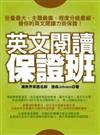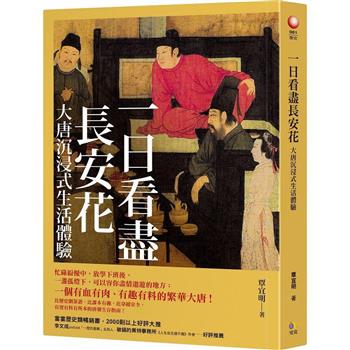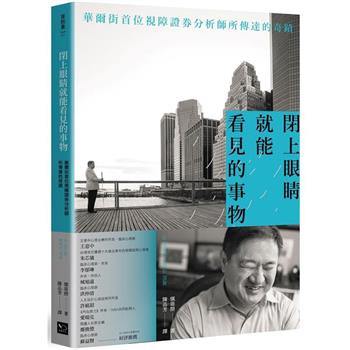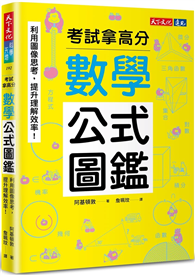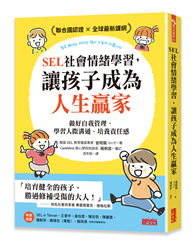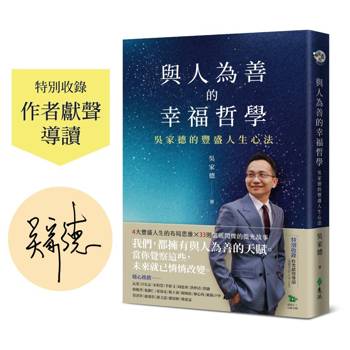單字都認識 ≠ 文意都了解
你……真的「看」懂英文了嗎?!
市售第一本份量最大、
主題最廣、程度分級最細文章讀本,
適用國中升高中、高中升大學、
英語初學者、多益405-990分程度者,以及職場商務人士!
透過大量文章的吸收、測驗題的輔助,
提升文章理解+英文寫作能力!
份量最大──全書收錄95篇閱讀文章x大量閱讀測驗題,學習最扎實!
主題最廣──從生活中選題,並各有其特別、具體的知識內容,全面發掘你的閱讀能力!
程度分級最細── Level 1國中小必考、英語入門必備單字範圍
Level 2國中小必考、日常生活交談必備單字範圍
Level 3國中小必考、多益405-600分、社交生活必備單字範圍
Level 4高中升大學必考、多益605-780分、一般職場商務人士適用單字範圍
Level 5高中升大學必考、多益785-900分、參加英文商務會議適用單字範圍
Level 6高中升大學必考、多益905-990分、參加全球商務研討會適用單字範圍
夠份量才敢大聲說:「替你的英文閱讀能力掛保證!」
《英文閱讀保證班》全書共收錄95篇文章,以個別文章程度分成6個Level,單字程度涵蓋基測、學測、多益、日常社交生活、職場商務必備、參加英文商務會議或研討會必備,全面適用國中升高中、高中升大學、英語初學者、多益405-990分程度者,以及職場商務人士,不管是為了學業或職業, 《英文閱讀保證班》都是你絕對不可或缺的讀本!
透過大量文章的吸收、測驗題的輔助,提升文章理解+英文寫作能力!
「閱讀」這個動作強調「理解文章或書中內容」,人類透過「閱讀」可以擴大自己的視野,增強對文章的理解能力,而單字量的擴充或是文法能力的提升都是其附加價值。
「閱讀」時,無須每個不認識的字都查字典,而是應從上、下句的文意去猜出字義,《英文閱讀保證班》書中的文章若有不符合該程度的單字都會貼心標注中文解釋,如果某部份的內容真的猜不出來再查字典,從其中訓練自己抓到「關鍵字」的技巧,進而學會抓到「整篇文意」。書中每篇文章都附有五題測驗題,主要是為了讓讀者檢測自己對於文意的理解程度,出題方向大至文章主旨、小至句子裡所提供的基本資訊,在對通篇文章的全面理解之後,勢必能提升對知識的吸收和文字表達技巧,無形中即是增強了自己的寫作能力。
作者簡介:
■ 補教界英語名師──強森(Johnson)
擁有美國UCLA語言教學研究碩士學位,大學時期以優異的英文能力擔任China-Post make-up editor(中國英語郵報編輯),並專任高中家教班英語講師多年,多年來致力於推動全民英檢教學,其任教班級為全體系GEPT中級通過率最高。為一同樣擁有超高人氣的英語補教名師,擅長「英文寫作」和「會話」,道地口音讓學生們大大地提高了上課的興趣。
【著作】
《黑馬英文單字》(強森、李維◎合著)
【最新著作】
《英文閱讀保證班》
章節試閱
以〔Level 01 ── Article 01 我對於「國家」的定義〕為例:
題目換成這些也適用:「國家」的意義、「國家」與我、台灣
※試著讀懂這篇文章吧!
I learnt the word “country” when I was four years old. At that time, I knew few things. I was not able to understand how important the word is, so I asked my mother. She told me that our country is not very big, but it is full of trees, flowers, fruits, vehicles, houses and all the other things that I have known.
Later, I learnt that there were a lot of other countries in the whole world. Some of them are bigger than our country, but some of them are smaller. Some of them are stronger than our country, but some of them are weaker. When I got older, I realized that a country is just like a person. For example, I have many friends. Some of my friends are taller than me, so they might be stronger. They always help me when I have difficulties. On the other hand, some of my friends are shorter than me and seems to be weaker. Sometimes, they would fall ill, but every person would try their best to become stronger, and so would a country.
When I grew up, I get the meaning of “country” more deeply. Every person is an important member of their country. If you want your country to be strong, you have to work hard. Every single person is important to form a strong country. In other words, if everyone becomes better and better, the whole country will of course become stronger and stronger. It is also important for young people to realize the meaning and the importance of “country” in the process of education.
※參考中文翻譯
四歲時第一次學到「國家」這個名詞。 那個時候,我懂得的事情很少。 不知道這個詞多麼重要,所以問了我的媽媽。 她告訴我,我們的國家雖然不大,但有很多的樹、花、水果、汽車、房子和其他我所知道的事情。
而後,我學習到這個世界上有很多其他的國家,有些國家比我們大,有些比我們小;有些國家比我們強,有些較弱。年紀稍長後,我明白一個國家就像是一個「人」。 例如,我有很多的朋友。有些比我高,所以或許他們更強壯。當我遇到困難時他們總是幫助我。另一方面,有些朋友比我還要矮,看起來比較弱小。有的時候,他們還會生病。但是每個人都盡力讓自己變的更加強大,同樣,國家也是這樣。
當我長大後,我更加深刻的理解「國家」這個字的含意。 每個人都是自己國家重要的成員。如果想讓自己的國家更加強壯,每個人都應該努力地工作。 每個人對於一個強大國家的形成都是很重要的。換句話說,如果每個人都越來越好,我們的國家一定會越來越強大。重要的是,年輕人在受教育的過程中,須了解「國家」的重要性。
※馬上挑戰自己對全篇文章的理解程度!
1. How old was the author when he learnt the word “country”?
A. Five
B. Forty
C. Four
D. Fourteen
2. Who did the author ask for the meaning of “country”?
A. His friend
B. His teacher
C. No one
D. His mom
3. Which statement is false?
A. It is not important for the young people to learn the importance of “country”.
B. Everyone is an important member of his or her country.
C. If you want your country to be strong, you have to work hard.
D. There are a lot of countries in the world.
4. What does the author thinks a “country” is like?
A. Person
B. Tree
C. Vehicle
D. Houses
5. What does this article imply?
A. We should be strong so we can help our friends
B. It is ok not to understand the meaning of “country” when young.
C. It is important for everyone to understand the importance of a country.
D. If you are short then you must be weak.
※參考解答
( C ) 1. 作者是幾歲時學到「國家」這個詞?
A. 五歲
B. 四十歲
C. 四歲
D. 十四歲
( D ) 2. 作者是向誰請教「國家」這個詞?
A. 他的朋友
B. 他的老師
C. 沒有人
D. 他的媽媽
( A ) 3. 下列何者為誤?
A. 對於年輕人而言學習「國家」並不重要。
B. 每個人都是自己國家的重要成員。
C. 如果你想要國家強大,就必須努力工作。
D. 這個世界上有很多國家。
( A ) 4. 作者將「國家」比喻為?
A. 人
B. 樹
C. 運輸工具
D. 房子
( C ) 5. 這篇文章的主旨是?
A. 我們應該要強壯才能幫助朋友
B. 年輕不明白「國家」的意思並沒有關係。
C. 每個人都應該了解“國家”的重要性。
D. 如果你很矮,你一定很軟弱。
以〔Level 01 ── Article 01 我對於「國家」的定義〕為例:
題目換成這些也適用:「國家」的意義、「國家」與我、台灣
※試著讀懂這篇文章吧!
I learnt the word “country” when I was four years old. At that time, I knew few things. I was not able to understand how important the word is, so I asked my mother. She told me that our country is not very big, but it is full of trees, flowers, fruits, vehicles, houses and all the other things that I have known.
Later, I learnt that there were a lot...
